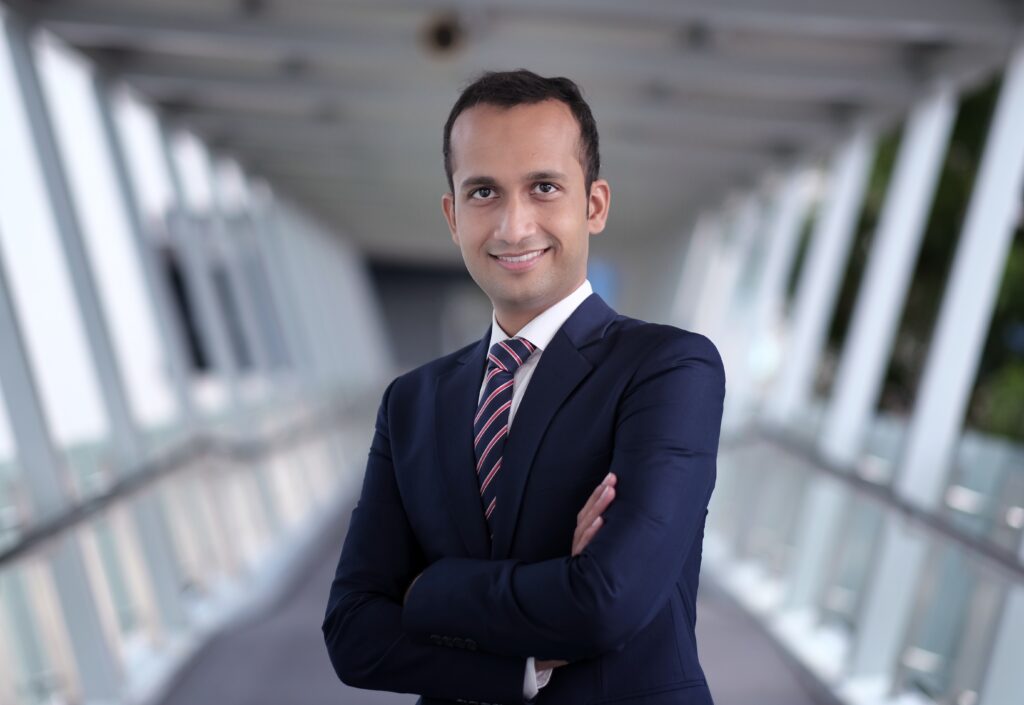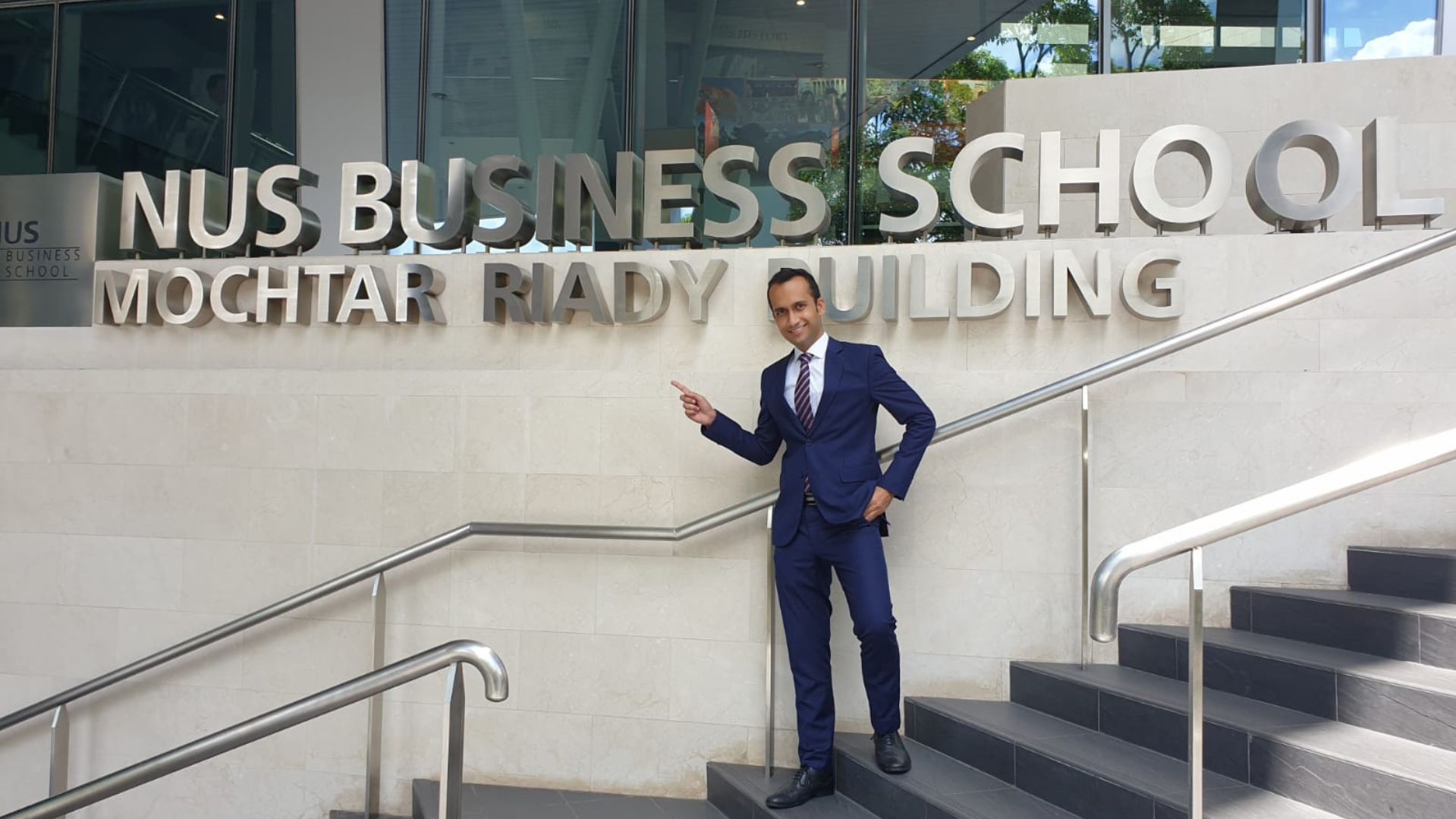Navigating the Path to Green Finance: An Interview with a Clean Energy Investment Specialist
In this interview, we delve into the journey of NUS MBA Class of 2022 Talha Ameer Khan, Deputy CEO of Burj Capital, a seasoned finance professional who has made significant strides in the field of clean energy investment. Talha shares highlights of his journey – his transition into green finance, and the role of his MBA in shaping his career. Talha also offers advice to MBA aspirants interested in a similar sector.

Can you tell us about your background?
I earned my Bachelor of Business Administration, majoring in Finance, from the Institute of Business Administration in Karachi, the top-ranked business school in Pakistan. I was awarded a 50% merit-based scholarship and maintained a high academic standing throughout my studies. I am a CFA Charter Holder and an FMVA-certified financial modeler. I have over a decade of experience in various finance roles, including Project Financing, Investment Banking, Corporate Finance, and Credit & FI Risk Management. My prior experiences in various banks have provided me with opportunities to develop and demonstrate my skills in investment banking, including structuring and executing debt financing deals, IPOs, and credit risk analysis.
How did you venture into clean energy investment?
My aspiration to work in a development finance institute post-MBA was fueled by a desire to contribute to the economic development of my country and other under-developed nations. This objective guided my exploration of various job opportunities during and after my MBA. Given the current environmental challenges, particularly in regions like India and Pakistan, green finance has become a critical focus. My previous experience in project finance and investment banking, coupled with my MBA education, aligns well with this field. Upon returning to Pakistan post-MBA, I discovered Burj Capital’s initiative to launch Pakistan’s first clean energy listed fund, a significant step towards transforming the local market’s green investment landscape.
Why did you choose the NUS MBA, and how did it help you further your career goals?
Over the years, I have honed a strong set of technical skills in the field of finance, bolstered by my CFA and relevant work experience. However, I recognized a need to further develop my leadership, team management, negotiation, and presentation skills. The NUS MBA program provided the ideal opportunity for personal and professional growth through a blend of classroom and practical learning experiences. The program primarily aims to transform students into future business leaders by fostering effective communication, decision-making, and influencing skills. During my studies, I focused on enhancing my soft skills through active participation in events, networking, and class participation, which helped me evolve into a well-rounded finance professional.
Infrastructure development is crucial for an economy to achieve sustainable growth. However, the current infrastructure of Pakistan, particularly in Karachi, is outdated and in urgent need of upgrades. According to the 2018 World Bank report, Karachi requires approximately USD 9-10 billion of financing over the next decade to improve urban transport, water supply, sanitation, and municipal solid waste management. Given the government’s severe fiscal deficit, active investment by the private sector through Public-Private Partnerships presents the only viable solution. Post-MBA, my goal was to join a development agency or private firm and promote infrastructure development through public-private partnerships. I eventually joined an investment company that promotes infrastructure development in energy markets both locally and globally through private sector investments.
Thus, my MBA from the NUS Business School served as a cornerstone and critical milestone towards achieving my long-term goals of development finance and sustainable investments
Could you discuss some of the activities you engaged in during your MBA that align with your current career path?
Throughout my MBA, I immersed myself in a variety of extracurricular activities. As the elected president of the NUS MBA Finance Club, I organized a range of events for my cohort, both online and offline. These events covered diverse areas of finance, including Venture Capital, Private Equity, Investment Banking, and Project Finance. In addition, I focused on arranging skill development workshops, such as one on financial modelling. I also had the opportunity to serve as a trainer for a financial modelling workshop. These activities not only fostered valuable industry connections for the MBA cohort but also helped me expand my professional network.
Outside of the club, I participated in numerous case competitions, including the Venture Capital Investment Competition (VCIC), the Climate Investment Challenge, and others at partner schools like IESE, Kellogg, and Michigan Ross. These experiences provided me with invaluable learning opportunities. At NUS, I gained significant exposure to the startup culture, while during my semester exchange at the London Business School, I developed valuable skills and gained exposure to the Private Equity culture. The extensive alumni network at NUS has proven beneficial in making connections and learning from others in the field.
How would you summarize your NUS MBA experience in three key highlights?
Firstly, my extracurricular involvement stands out as a significant aspect of my MBA journey. As the Finance Club President, I had the opportunity to refine my leadership skills by spearheading a range of events that facilitated learning for our cohort. Participating in case competitions also allowed me to apply my acquired knowledge to real-world challenges. Secondly, the networking opportunities provided by the program were invaluable. They enabled me to connect with like-minded individuals and expand my professional network. Lastly, the wealth of knowledge I gained through my electives and workshops was a crucial part of my MBA experience. I took electives in project financing, venture capital and private equity, entrepreneurial finance, and sustainable finance. Additionally, I attended an advanced financial modelling workshop, which further enhanced my skill set.
What advice would you offer to other MBA aspirants who are interested in pursuing a similar career path?
My advice to MBA aspirants would be to really immerse yourselves in the MBA experience. It’s not just about the classes and the coursework, it’s about the entire journey. One of the most valuable assets you can gain from your MBA is a strong network. Make it a point to connect with your peers, professors, and alumni. These connections can open doors and provide insights that can be incredibly beneficial to your career. Participation in club activities is another fantastic way to enhance your MBA experience. It’s a chance to apply what you’re learning in a practical setting, and it also provides opportunities for leadership and teamwork. Workshops are another excellent resource. They can help you develop specific skills and deepen your understanding of certain topics. So, don’t hesitate to attend as many as you can. When it comes to choosing elective courses, be selective. Think about what skills and knowledge you want to gain from your MBA and choose courses that align with those goals. Lastly, follow a structured approach to your studies and really dive into the course material. The more effort you put into understanding and applying what you’re learning, the more you’ll get out of your MBA experience.


